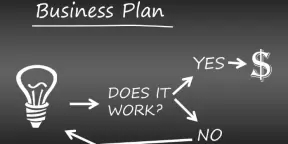Business Planning
A business strategy is a fundamental tactic or combination of tactics to hit goals such as growing the business, gaining a competitive edge or turning around an ailing business. Your business strategy is brought to life by creating a business plan. Business strategies are essential for your long-term direction and success. What are the different types of business strategies? There are many different business strategies for a small business and some of the common ones are: Cost advantage strategy: This is where you focus on offering the lowest cost in the
Continue Reading Continue Reading5.24K MEMBERS
Join group

Track, analyse and improve the performance of your process, employees or your entire business.

Audit your finances to identify leakages, cost saving opportunities and new revenue streams.

Unlock your potential to help you grow your business

Conduct an audit of your marketing strategies, objectives and campaigns to identify which areas can be improved.

Improve efficiency and remove any roadblocks in your organisational structure, process, systems and workflow.

Find out how healthy your business is. Learn what you’re doing well, what you can improve and whether your business can go the distance.

Unlock your full potential as a business owner to achieve your long-term business goals.

Assess the market-fit of your product or service against your competitors and the supply demand to see where your business sits.

Plan how your business can prepare for and continue to operate after a serious incident or crisis.

Review where your business currently is and develop a plan of action to achieve your long-term business goals.

Business coaches can steer your business in the right direction for short and long-term growth.

Assess and mitigate the various risks your business faces from a legal, finance and marketing perspective.

Maximise your time management and increase productivity levels across your whole business.

Produce a viable, strategic and realistic business plan that will set you up for success.
Are business plans a thing of the past?
With the introduction of lean canvases, do we still see value in creating business plans?
1.46K views

Steven Freeman at Evolved Sound
For small businesses 100 page plan documents full of fluff and not a lot of real accountable substance are few and far between.
From what I have seen even a 1 page plan which is actively followed, monitored and updated every 3 - 6 months is very now and worth its weight in gold.
A practical approach I have more recently incorporated is best summarised as follows:
Plan quarterly
Prepare weekly
Act daily.
6 Practical Tips To Keep Your Business Above Water In A Downturn
There is nothing fancy to be done, rather a back to basics approach. Here are the top 6 things to do. 1. Deliver a quality product or service. Whether this is your personal labour or your company’s...
1.42K views
Which should come first: Product or business strategy?
For those starting a business, which is more important to develop first? Or should they be developed together? Ultimately, is the product more important or business strategy more important for a...
537 views

Evan Rubenstein, Owner at Evan Rubenstein Business Growth Strategies
The best answer is that it is situational. If it's a completely new product and it needs a business to support its development and market progress then ... expand
There are three possibilities: Product and business at the same time; business first and product second or product first, business second.
The best answer is that it is situational. If it's a completely new product and it needs a business to support its development and market progress then they should be developed together. Issues like getting feedback from the market to support product development is a business exercise that will drive the product strategy. By the same token, product enhancements and ongoing investement will often be driven or constrained by business realities and market reception. And so in this case the product and business development will happen in lock-step and have the highest liklyehood of succeeding - all other things being equal.
In the next case, if an entrepreneur starts a business to address an opportunity or a gap in the market, the product required may not yet be properly defined. The business may start, raise capital and employ people with the right skills to help conceive and develop the product. In this case the business has to start first and its inherent strategy tailored to the product development cycle. This is a common scenario nowadays.
In the third case, as is common with backyard inventors say, often products are developed to quite a level of completion without due regard to the business issues that will ultimately govern its acceptance and success. It is likly in such a scenario, that both fail, as a good product needs a good business for it to succeed intoday's world.
How much do business consultants charge to work on business strategies?
What's the price range to review and improve a small business's business strategies? What are the factors that affect the price?
693 views

Ozana Giusca, CEO & Founder at tooliers
To answer this question, i find it very difficult because it depends on too many aspects. It is like asking how much would a car cost. ... expand
This is a great question. I love it because many small businesses don't even have a strategy or don't consider asking someone to review. Congratulations!
To answer this question, i find it very difficult because it depends on too many aspects. It is like asking how much would a car cost. Do you mean a Mercedes or a Toyota?
I can give you my own price because I dont want to mislead you.
For us, it will be cca an hour with myself or my partner, and this would be $497 - and it would be disscussion rather than reading a document.
Reviewing a document is way more difficult to price because it depends on what the document is and how much research needs to be done outside of the info there.
We prefer to do an audit combined with the review of the strategy so we better understand the business. This may be cca $3,000. There may be money to be made easily which can come out of that audit and cannot be seen in a strategy that was done without an exterior eye.
Hope this helps. and if you need further assitance, pls have a look at this video
https://www.ozanagiusca.com/en/shop/consulting-services
It is about maximising the company's value and you will understand what is missing from what you have already.
Of course, would love to help you further - just get in touch.
ozana
How to Efficiently Grow a Small Business on a Tight Budget
Small businesses that are just starting out have to use their money as wisely as possible, getting the best value for the lowest price, and cutting off all extraneous costs. Marketing strategies...
3.53K views
Top 6 Must-Do Tasks to Review Your Business Performance Before EOFY
As the end of the financial year comes up, there are some tasks you must undertake. The first two: look at how you did and then reflect on what you can do better. Next, work on ways you to improve...
2.63K views
Are internal processes or external brand perception in your driver's seat?
What do I mean? Simply what is currently a larger driver of your business (for better or worse) What keeps you up at night? Are you more bias to positive or negative feedback (internally and...
1.13K views

Deborah Vella at Support Legal
Both internal processes and external brand perception are important in business. As the owner of a law practice providing legal services, the external brand perception for Support Legal and personal reputation of myself as a lawyer are crucial to successful practice.
That being said, my internal processes go along way to maintaining a quality brand perception and good legal services. Therefore I believe that you can't have success in one without success in the other.
Information overload: cutting to the chase.
Small business advice is big business, with an entire industry telling you how to run a better business, start your business, grow your business and every conceivable topic in between. You can...
2.15K views
I Have Created a Business Plan: Now What?
If you've been in the business world for a while, then you definitely know the importance of creating a business plan before starting out. However, simply writing down a beautiful business...
16.18K views
What are your goals for the new financial year?
Would anyone like to share their goals for the next financial year?
1.25K views

Rebecca Carroll-Bell at RCB Mediation Services
Hmm, I shoudl set some. Great reminder Sophie.

Stuart Reynolds, Partner at Fullstack Advisory
But as some of the other responses have mentioned, the first step is to think about why you need and/ or want one. Begin with the end in mind, as ... expand
We work with lots of startups, and as a starting point, I want to mention that it *is* important to have a business plan in some form or other.
But as some of the other responses have mentioned, the first step is to think about why you need and/ or want one. Begin with the end in mind, as they say, and you’re much more likely to create a business plan that will effectively serve its purpose.
Having said that, to answer your question, I do think it’s a combination of both.
That is, a template can provide a great starting point for a business plan. But it’s unlikely to cover everything you need - this is where you’ll need to customise it.
I’m a fan of efficiency wherever possible, so if you can (quickly) find a template that serves your needs, it will help you shortcut the process. Writing a business plan can be arduous, so anywhere you can get support and help is worthwhile, in my opinion!
If you’re writing a business plan that needs to appeal to investors, make sure it includes the relevant info in an easily digestible format. Investors want to know your business will have a good return for them - make that your focus.
The supporting document should be a financial model. A solid financial plan should capture as much information about the business plan as reasonably possible – the team, the value proposition and technology, the market, milestones and the competition – and translate these into measurable, financial values.
- Top influencers in Business Planning
 Ronan Leonard
Ronan LeonardFounder at Eccountability
Top 20%
Business Planning
Top 20%
Business Planning Bruce Patten
Bruce PattenDirector at Pattens Group Pty Ltd
Top 30%
Business Planning -
Featured Offer
This is a Premium Business feature
What is Business Planning?
A business strategy is a fundamental tactic or combination of tactics to hit goals such as growing the business, gaining a competitive edge or turning around an ailing business. Your business strategy is brought to life by creating a business plan. Business strategies are essential for your long-term direction and success.
What are the different types of business strategies?
There are many different business strategies for a small business and some of the common ones are:
- Cost advantage strategy: This is where you focus on offering the lowest cost in the market.
- Volume strategy: This is where you focus on getting high volumes of sale at a smaller profit margin.
- Niche strategy: Your business focuses on a narrow but in-depth area instead of a wide range of product, service or customer.
- Bespoke strategy: You tailor your product or service to your customers, commanding a higher price.
How to develop the best business strategy ideas?
In order to develop the best business strategy ideas, you must do a comprehensive market research, study your competitors, utilise new technologies and take inspiration from big brands or small businesses from other industries. If in doubt, hire business advisors and coaches to refine your business strategies.
How to write a business plan?
A typical business plan projects between 3 to 5 years ahead and is constantly being updated, refined and reviewed to reflect the current position, direction and goals. There are several common elements in a business plan.
- Executive summary:Like an introduction or overview, your executive summary is usually a 1-page snapshot of the overall business plan. A good executive summary should be detailed enough to give an investor a solid understanding of the business but brief enough to be reviewed within minutes.
- Business description:The description is a breakdown of what you do, where and how you operate, the target audience and branding.
- Market analysis:This consists of research into external factors of the marketplace, the industry and the competitors.
- Organisational objectives:This section sets out the business goals for short, mid and long term. They must be specific and measurable.
- Organisation and management structure:This touches on the hierarchy of the organisation, the function of various roles and the workflow throughout the organisation.
- Product/services:A detailed overview of your product and service including pricing, manufacturing, specifications, distribution and other relevant information.
- Marketing and sales strategy:This crucial component follows through from the market analysis section. The marketing and sales strategy determines how a business will get from their current market position to the new position detailed in the organisational objectives.
- Financial information:Projections, forecasts and budgets are important information to present in a business plan. Banks and investors use this essential part to approve funding.
- Appendix:Supporting information which is relevant or interesting should be attached to the business plan as appendices.
FAQ
Is a business coach worth it?
The most important question when it comes to whether business coaching is worth it is, "Is business coaching worth it for you?" What exactly are you looking to gain and how much time, money and energy are you willing to spend to get where you want to be?
When should you get small business coaching services?
There are many reasons why small business owners get coaching services. Here are just some of the reasons:
- You wish you could delegate or consult with someone but you don’t know who
- You need a structured coaching approach to motivate you
- You want to increase productivity
- You need the expertise to solve specific problems
- You have a general sense that something is stopping your business from reaching its full potential
- You know your business could do better but you just don’t know-how
If you said yes to any of the above (or you may have your own personal reasons), then you should consider hiring a business coach.










